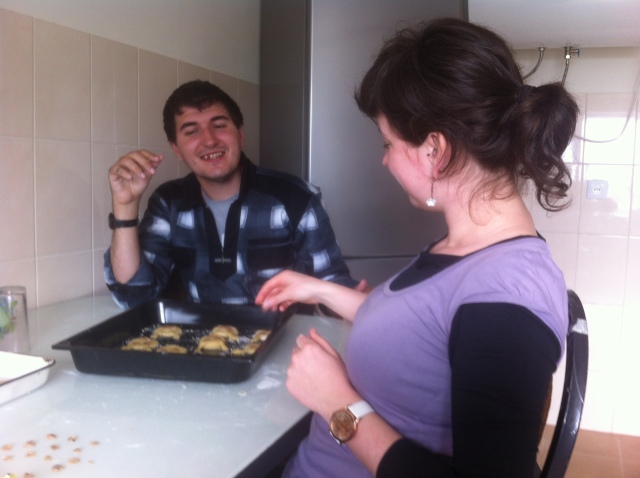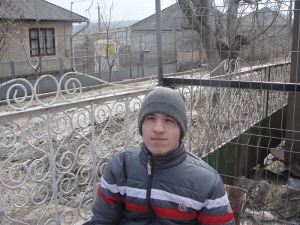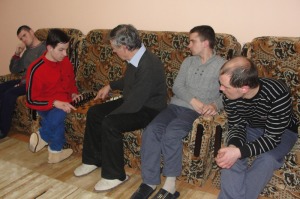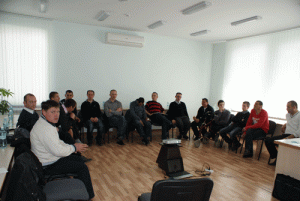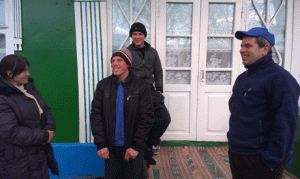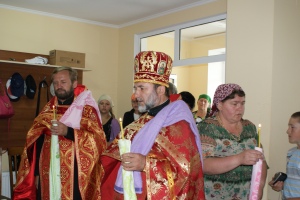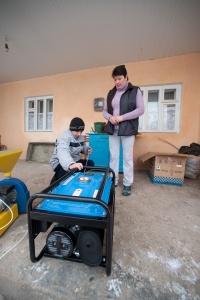This summer Hansca Community Home had a volunteer from Switzerland. She managed to develop beautiful relationships with each one of the guys who live there and to find out what they like. She told us she liked the atmosphere in Community Home and the food very much. 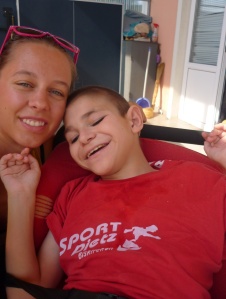
We invite you to get to know her from the following interview:
I: Please, tell me your name and occupation.
Judit: Judit Bünter, Student.
I’ll become a secondary school teacher in Switzerland. In Switzerland we study four subjects to become a secondary school teacher. I study German, English, Music and Geography. I’ll finish my studies next year.
I: Tell me a little about your background.
Judit: I was never really a volunteer in other countries but I’ve already taught German in England (during my Erasmus Program) and in Macedonia (where I also stayed for one month). Furthermore, I’ve spent two months in Tanzania last summer to observe and support teachers there. We’ve also helped them to organize a school garden. I’ve wrote my master thesis about this project.
I: How did you ended up here, in Moldova, in Hansca Community Home?
Judit: I wanted to do something useful during my summer term and visit a country I’ve never been to before.
I: For how long have you been staying here?
Judit: Four Weeks
I: Do you enjoy staying here? Why?
 Judit: Yes. I had an enjoyable working atmosphere. I got in contact with friendly and supportive people and I had the opportunity to discover Moldova a bit.
Judit: Yes. I had an enjoyable working atmosphere. I got in contact with friendly and supportive people and I had the opportunity to discover Moldova a bit.
I: What do you like here the most?
Judit: It’s hard to pick only one thing. I guess it’s a mix of everything: the guys and working colleagues, new friends, Chisinau, the country side, cheap prices and fantastic food.
I: What about the guys? How do you communicate with them?
Judit: I tried to speak Romanian as good as I could but most of the time I spoke English. I’ve used a lot of gestures though.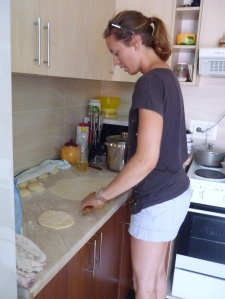
I: Tell me about your relationship with each of them.
Judit: Mihai. He’s got his own mind and is only doing what he wants. One can’t really ‘force’ him into doing something he doesn’t want to. On the other hand, however, he liked dancing with me and ‘interviewed’ me couple of times. Generally speaking, I didn’t spend that much time with him because he was also able to entertain himself.
Victor. It’s a pity that he can’t talk. But we have a very good relation. We were giggling and playing a lot. He is my little sunshine.
Ion. I had the impression that he liked my massages. He always took my hand and placed it at the neck which meant that this is good.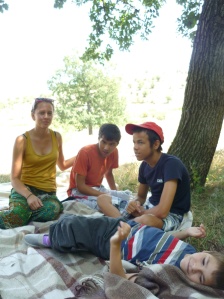
Sergiu. He always wanted to have a massage on the back. It was pretty nice to see that it has a relaxing influence on him. Furthermore, he liked to dance with me. I also had to snap with my fingers, clap my hands or making sounds with my mouth. I observed several time that he reacts positively to music.
Ion. He always said my name and begged for water. In fact, that meant that he wanted to have my attention. He likes to be included and having people around him.
Andrei. I’ve started to build those towers of wooden sticks with him to improve his dexterity. In addition, he’d liked to count from 1 to 10 in all languages I know.
I: What do you usually do together?
Judit: Playing, drawing, talking, dancing, giving massages, cooking, eating, watching TV
I: What do you think about the service, the personnel?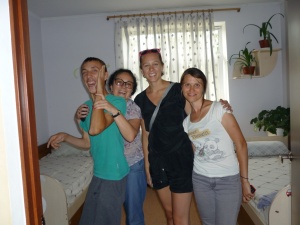
Judit: I was so pleased that my working colleagues were so great. Each and every one of them tried to talk to me. They also cooked very well and were interested in my background.
I: Have you been in such services in other places?
Judit: No, they were not really comparable.
I: In your opinion, is there something that needs to be changed or improved?
Judit: Summers are pretty hot in Moldova so maybe more shelters are needed also to play outdoors. And I’m not sure whether the guys drink enough water during this hot period.
I: How do you plan to use the experience that you gained here?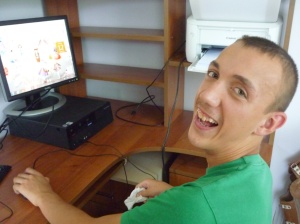
Judit: Social experiences are useful in everyday life. I’ve never worked with persons with disabilities before but now I have a little impression of what it feels like to work with them.
I: Thank you, Judit!
 Every person with disabilities has abilities that deserve to be promoted. It is because of pity, indifference and ignorance that their abilities remain unknown. Persons with disabilities need respect and support to assert themselves as full members of society.
Every person with disabilities has abilities that deserve to be promoted. It is because of pity, indifference and ignorance that their abilities remain unknown. Persons with disabilities need respect and support to assert themselves as full members of society.






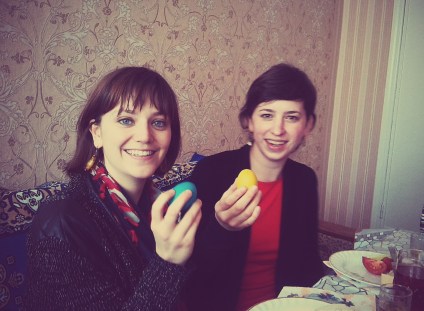
 We first met Alexandru, whom we picked up from Orhei institution and went with us to Nisporeni Community home. For him was the first day in a new home… We met Anton, the sweet sixteen year old boy and Vasile, sitting on his regular spot on the couch. Then we were guided to the room of three other guys, Slavic, Pavel and Marius. Our first impression was that it might be harder to have a connection with them, since they had to lay in bed all day due to some muscle-disease. At the end of the week, we would be proven to be absolutely wrong in this first impression.
We first met Alexandru, whom we picked up from Orhei institution and went with us to Nisporeni Community home. For him was the first day in a new home… We met Anton, the sweet sixteen year old boy and Vasile, sitting on his regular spot on the couch. Then we were guided to the room of three other guys, Slavic, Pavel and Marius. Our first impression was that it might be harder to have a connection with them, since they had to lay in bed all day due to some muscle-disease. At the end of the week, we would be proven to be absolutely wrong in this first impression.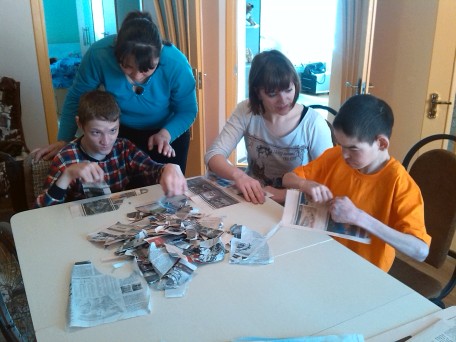 The second week we moved to other Community home from Chirca/ Anenii Noi, where we met very different guys. To begin with, they were adults so we would have to focus more on functional activities while having fun as well. We had Victor, the most independent guy; Efim, with the mischievous twinkle in his eye and we had Petru saying our names in the most beautiful way (boyfriends: listen and learn :-)). Then we had our two guys in a wheelchair, Ion being all muscle and Mihai being all laughs, and Gabriel.
The second week we moved to other Community home from Chirca/ Anenii Noi, where we met very different guys. To begin with, they were adults so we would have to focus more on functional activities while having fun as well. We had Victor, the most independent guy; Efim, with the mischievous twinkle in his eye and we had Petru saying our names in the most beautiful way (boyfriends: listen and learn :-)). Then we had our two guys in a wheelchair, Ion being all muscle and Mihai being all laughs, and Gabriel.